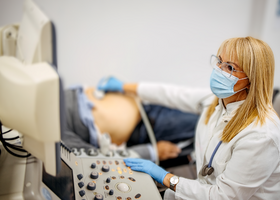Diabetes
Diabetes is a disease in which the body either cannot produce insulin (type 1 diabetes) or cannot properly use the insulin it produces (type 2 diabetes). There are an estimated 11.7 million Canadians living with diabetes or prediabetes with an annual $30 billion cost to the healthcare system.
Insulin, produced by the beta cells in the pancreas, is an important hormone that helps the body control the level of glucose (sugar) in the blood. For many people, diabetes can be controlled with diet, exercise and, often, insulin or other drugs. Although lifesaving, insulin injection is not a cure for diabetes and chronically high blood sugar can cause serious complications including blindness, amputations, stroke, kidney failure, nerve damage, heart disease and a shortened lifespan.
The positive news is that innovative stem cell therapies may be the best answer for future treatment – and some of the most advanced research for this is taking place in Canada. Twenty years ago, the Edmonton Protocol demonstrated that replacement pancreatic tissue could temporarily alleviate the need for daily insulin injections, and it kickstarted research that is now in clinical trials. SCN has supported this work along the way and is shining a spotlight on Network researchers who are continuing to work avidly in the fight against diabetes. From 2019-2025, SCN has committed over $6 million in funding in innovative diabetes research and clinical trials.
 Biomanufacturing “self-islets” for Diabetes
Biomanufacturing “self-islets” for Diabetes
Dr. James Shapiro, University of Alberta
Building on 21 years of experience in islet transplant, Dr. James Shapiro’s SCN-funded Horizon Award focuses on developing a stem-cell based therapy to replace the damaged beta cells in people with various forms of diabetes. His team is working to make new beta cells from a patients’ own blood cells resulting in the acceptance of these new cells by the patients’ immune system and eliminating the need for organ donors and anti-rejection drugs. The new cells will be implanted under the patient’s skin. Dr. Shapiro’s team will also address a pressing Canadian biomanufacturing gap, and work to scale-up the production of sufficient self-islets for transplantation into patients, and the self-islets will then be evaluated in a clinical trial. Ultimately, Dr. Shapiro and his team hope to develop a scalable solution to advance the therapies for millions of people living with diabetes across the globe.
https://www.researchgate.net/lab/A-M-J-Shapiro-Lab
“Our research goal is to produce the world’s first functional cure for diabetes, enhancing the lifespan and quality of life for those diagnosed with this disease. This therapy would also benefit the healthcare system by reducing the high costs associated with diabetes care and its complications.” – Dr. James Shapiro
 Eliminating Insulin Injection with the First Gene-Edited Cell Therapy for T1D
Eliminating Insulin Injection with the First Gene-Edited Cell Therapy for T1D
Dr. David Thompson, University of British Columbia
Dr. David Thompson’s team will be conducting a clinical trial of the first gene-edited cell replacement therapy for type 1 diabetes. If successful, this innovative approach could put an end to insulin injections and mark another major milestone in Canada’s diabetes research history. This SCN-funded project is testing cells that have been genetically engineered to evade the immune system, loaded into thin devices and implanted under the skin. These stealthy cells remove the need for immunosuppression. The team consists of Dr. Tim Kieffer, an authority on cell therapy for diabetes whose research provides strong scientific support for the trial, surgeon Dr. Peter Kim who performs the implants, clinician Dr. Graydon Meneilly who is an expert in diabetes management, Dr. Megan Levings, a world-renowned immunologist who will monitor patients for immune responses to the implanted cells, Dr. Tania Bubela who will consider regulatory and reimbursement options and patient perspectives, and project leader Dr. David Thompson, who is the clinical trial site PI and whom will carefully follow the patients.
https://medicine.med.ubc.ca/profiles/david-m-thompson/
“We have conducted successful trials in which islet cells generated from stem cells are implanted under the skin. The challenge has been the need to use anti-rejection drugs. Now in a world’s first, we are testing genetically engineered cells, eliminating the need for immunosuppression. If successful, this innovative approach could free Canadians from insulin injections, and the debilitating complications of diabetes.” – Dr. David Thompson
 Positioning Canada as a World-Leader in Cell Therapy Manufacturing for Regenerative Medicine
Positioning Canada as a World-Leader in Cell Therapy Manufacturing for Regenerative Medicine
Dr. Nika Shakiba, University of British Columbia
Dr. Nika Shakiba’s SCN-funded project aims to tackle the challenge associated with large-scale production of human pluripotent stem cells (hPSCs) for cell therapy production. With several clinical trials underway, such as the transplantation of beta cells derived from hPSCs to treat diabetes, clinical demand for hPSCs is growing. The main challenge is that the production of hPSCs results in the emergence of “variants” with undesirable genetic changes, making them unsuitable for clinical use in diabetes studies. Dr. Shakiba’s team will use a bioengineering approach and computational models to understand how variants ‘survive and thrive’ in culture, with the goal of enabling large-scale production of safe hPSCs – work that is applicable in diabetes research as well as other disease areas.
“Our team will be using cutting-edge genetic tools to track hPSCs, providing a high-resolution look at the growth of each cell. The findings from our Stem Cell Network-funded program will enable the safe and reliable large-scale production of hPSCs, bolstering Canada’s position as a world leader in cell therapy manufacturing for regenerative medicine.” – Dr. Nika Shakiba
 Developing An Improved Cell Therapy for Diabetes
Developing An Improved Cell Therapy for Diabetes
Dr. Bruce Verchere, University of British Columbia
Hundreds of patients worldwide have received transplants of islet beta cells – enabling better blood glucose control without the need for insulin injection. However, organ donor shortages, transplant rejection, and transplant failure elicits the need for new sources of insulin-producing cells for the millions of Canadians living with this disease. Dr. Verchere’s SCN-funded project aims to produce a new and improved cell source for replacement therapy in diabetes. Having already made advances with genetically engineered stem cells to differentiate them into insulin-producing cells, Dr. Verchere’s team is now working to test these cells and evaluate their ability to maintain a normal concentration of blood sugar following transplantation. The ultimate goal of Dr. Verchere’s team is to produce a new and improved cell source for cell replacement therapy in diabetes, that can be moved into a clinical trial in a few years.
https://www.bcchr.ca/bverchere
“With continued SCN support, we are now testing genetically engineered, stem cell-derived, human insulin-producing cells in mouse models of diabetes to assess their ability to maintain normal glucose levels following transplantation. If successful, we will continue to clinical trials in humans. Our goal is to develop an improved cell therapy accessible to more people with type 1 diabetes and that lasts longer and works better.” – Dr. Bruce Verchere
 Developing a Bioprinted Insulin-Producing Device for Type 1 Diabetes
Developing a Bioprinted Insulin-Producing Device for Type 1 Diabetes
Dr. Timothy Kieffer, University of British Columbia
In collaboration with Aspect Biosystems, Dr. Kieffer’s SCN-funded project is focused on the development of a bioprinted, stem cell-based, insulin-producing device that that can be implanted in patients with type 1 diabetes. The device is designed to take over the production of insulin and regulate blood sugar levels naturally, eliminating the need for organ donation or the requirement for life-long immunosuppression following an islet transplant. Overall, Dr. Kieffer’s project aims to provide improved health for individuals living with type 1 diabetes and could serve as an effective and scalable made-in-Canada therapy, reducing the burden to the health care system and creating commercial opportunities.
https://kiefferlab.com/timothy-kieffer
“Stem cell-based treatments hold incredible promise as there is a virtually endless supply of cells that could treat type 1 diabetes. A single vial of stem cells the size of your baby finger could theoretically be expanded and converted into insulin-producing cells to treat everybody on the planet with diabetes.” – Dr. Timothy Kieffer

Photo Credit: Research Strategy, UHN
Developing a Novel Approach to Treat Type 1 Diabetes
Lead: Dr. Cristina Nostro, McEwen Stem Cell Institute, University Health Network, Toronto
Dr. Nostro is internationally recognized for her pioneering contributions to the development of insulin-producing beta cells from stem cells. Alongside her co-investigators from the University of Alberta, Dr. Andrew Pepper and Dr. Greg Korbutt, Dr. Nostro’s SCN-funded project focuses on optimizing the transplantation of stem cell-derived islet-like cells along with therapies that would eliminate the need for immunosuppression. This innovative cell therapy approach will dramatically improve the quality of life of T1D patients and reduce diabetes complications.
https://physiology.utoronto.ca/faculty/cristina-nostro
“Islet transplants are an effective treatment for patients with severe forms of T1D. However, the scarcity of donor pancreata and the requirement for life-long immunosuppression has launched the search for an alternative source of islets and strategies to protect them from rejection. Stem cells offer the ability to generate these cells in the lab. Our long-term goal is to translate the results of our studies to the clinic and establish methods in the lab for disease modeling, drug toxicity testing and drug discovery.” – Dr. Cristina Nostro
 Engineering Immune Cells to Better Treat Type 1 Diabetes
Engineering Immune Cells to Better Treat Type 1 Diabetes
Dr. Karoliina Tuomela, University of British Columbia
Dr. Tuomela is the inaugural J. Andrew McKee Fellow in T1D supported by JDRF Canada and SCN. Under the supervision of Dr. Megan Levings, her research focuses on regulatory T cells (Tregs), a type of cell that suppresses the immune response, and engineering Tregs to specifically suppress immune responses following the transplantation of beta cells to treat type 1 diabetes. If successful, this technique could prevent further inflammation and rejection following transplantation and improve a patient’s quality of life post-transplant by removing the need for lifelong immunosuppression.
“It’s just fantastic to be working in an area where there’s so much potential to see my research actually make a clinical impact, and make an impact that could really change someone’s life from very early years onwards.” – Dr. Karoliina Tuomela
To learn more about this program and/or apply to the 2024-2025 competition, visit: https://stemcellnetwork.ca/training/jdrf-scn-national-fellowship-program/







